Search Results
Showing results 21 to 40 of 103
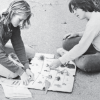
Plant Hunt
Source Institutions
In this outdoor activity and game, learners collect and sort leaf samples to determine how many types of plants grow in the activity site.

Heat Speeds Up Reactions
Source Institutions
In this activity, learners investigate the effect of heat on a reaction.

Race for Survival
Source Institutions
During this interactive "survival" game, students learn about the importance of camouflage and how it helps animals to blend into their surroundings, as either predator or prey.

Two Ball Bounce
Source Institutions
This is a quick, yet dramatic activity/demonstration that introduces learners to the concept of energy transfer. A small ball is placed on top of a large ball and both are dropped together.
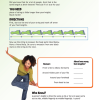
Bianca's Body Math
Source Institutions
In this Cyberchase activity, learners use math to explore how parts of the body are proportional.

Envirolopes
Source Institutions
In this outdoor activity and observation game, learners hunt for a variety of textures, colors, odors and evidence of organisms in the activity site.

Scavenger Hunt
Source Institutions
An outdoor scavenger hunt helps learners consider the theme of "What Is Life?" Learners explore what living organisms are, including how organisms meet basic needs of food, shelter and water to surviv

Water Striders
Source Institutions
In this outdoor activity/field trip, learners catch and observe water striders to explore their movement and feeding behaviors.

Build a Bell Bracelet
Source Institutions
Learners make bell bracelets, place them on their wrists or ankles, and then dance to the rhythms and sounds the bells make. Many cultures use ankle or wrist bells to make music during dancing.
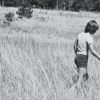
Animals in a Grassland
Source Institutions
In this outdoor, warm weather activity, learners use sweepnets to search a grassy area such as a large lawn or field, collecting small animals to find as many different kinds of animals as possible.
How Many In a Minute
Source Institutions
In this activity, learners will keep track of how much they can do in one minute. Instructors can pick something everyone will do for a minute, such as jumping up and down or drawing stars.
River Catcher
Source Institutions
In this activity (located at the top of the page), learners make an easy river strainer and see what they can catch.
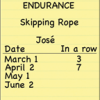
Endurance: How Many Can You Do in a Row?
Source Institutions
Combine math and exercise with this activity. Learners count how many times in a row they can skip rope or throw and catch a ball.

Scent Tracking
Source Institutions
In this wintertime outdoor activity, learners role play wolves tracking their prey by following scented trails.

Water Drop Races
Source Institutions
In this activity, learners will explore the physics of liquids and gas by playing with both! Learners of any age use their own breath to move drops of water across a smooth wax paper surface.

Pulse of Life: Measure Your Pulse
Source Institutions
In this activity, learners take their own pulse and explore how heart rate is affected by various activities.

Paper Airplane Contest
Source Institutions
In this fun physics activity (page 9 of the pdf), learners take part in a paper airplane design challenge.
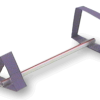
Straws and Airplanes
Source Institutions
Create airplanes from straws and geometric shapes. Test them out to see how far they can fly, or how accurately they can be aimed.

Don't Be Nerve-ous
Source Institutions
In this activity, learners discover a brain process called habituation.

Ocean Echolocation
Source Institutions
Use echolocation to find others and experience how whales’ senses have adapted to suit their environment. In pairs, learners are blindfolded and use containers filled with marbles to find each other.
